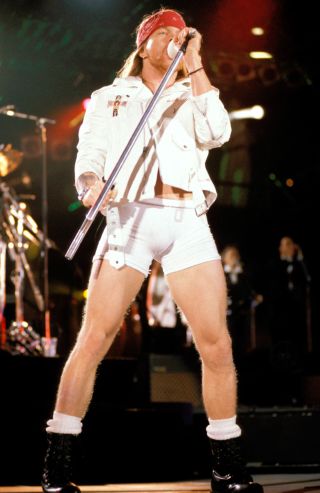Alter Bridge frontman Myles Kennedy recently told Classic Rock that the days of the megastar rock frontman are over. He’s right, but perhaps not for the reasons he believes.
Kennedy says kids today don’t want to be rock stars because “people want great music first and foremost.” But is the lack of 24-carat star frontmen in the world of hard rock really down to a sudden focus on songs rather than image and performance?
Received knowledge tells us that rock star behaviour suddenly became naff when Kurt Cobain singlehandedly ruined the careers of all those preening ‘80s metallers. Nirvana’s 1991 album Nevermind marked the end of narcissistic, ego-fuelled rock’n’roll. In its place came a determination to keep it real and to deny rock’s escapist, fantasist dimension. Oh, and there was lots of heroin too. In retrospect, it may not seem like rock got that great a deal out of grunge. It sort of stripped the fun out of rock.
The genre had its visceral thrills, of course. Who couldn’t get something emotional out of Alice In Chains’ Dirt? But grunge was monochrome, whereas old-school metal was saturated with colour. And while nobody in their right mind these days could be anything less than appalled by Mötley Crüe’s wanton ‘80s piggery (some of the photos I’ve seen of them ‘in action’ with women are just vile), there’s nevertheless a sense of mourning for the days when rock was fun, when David Lee Roth’s antics could light up a TV screen from a thousand paces, when bonkers old Axl Rose could hold 100,000 people jammed into a mega-stadium right in the palm of his hand.

Of course grunge may have written a new rulebook for rock, but even that’s not the main reason why being a rock star is now a minority sport. It’s because rock itself has become a minority sport. The figures prove it. First consider how overall physical sales have declined since rock’s ‘80s heyday. Now think about the fact that metal sales in the US today account for just six per cent of the total market. It’s a fact. There are less people who financially support heavy rock music today than there used to be.
Rock has failed to renew its audience. Everyone knows about the eternal question worried rock industry types keep asking. Where is the next long-term stadium band from this genre? Where is the next Metallica, basically? Well we may have to face up to the fact that there will never be another rock band as successful as Metallica, because there just aren’t enough new rock fans to support such a rise.
Interest in music is still massive. Widescreen music idols still exist. But they’re much more likely to come from the world of rap or EDM than from metal. Whether you love him or hate him, Kanye West is a huge star, with all of the character trappings that make him box office. He’s loud, he’s opinionated, he’s got a massive ego, he’s a showman, he’s a bit mad – all the things your old-school rock stars were. Beyonce’s Lemonade album may only have sold 1.2 million albums in the US, but it’s been streamed 115 million times on Tidal. The appetite for music is still there. The appetite for rock music is not.
- Is Myles Kennedy the world's most reluctant rockstar?
- Bono first man to be honoured at Glamour's Women Of The Year Awards
- In Praise of David Lee Roth – by Greg Puciato
- AC/DC with Axl Rose: The First Review
Young people simply aren’t looking to rock to provide them with their idols – if they’re looking at music at all. YouTube gamers and fashion bloggers now attract huge interest. PewDiePie has 49 million subscribers. It’s self-evident. People filming themselves in front of computers talking about video games are bona-fide new rock stars.
I read something interesting on Facebook recently, where someone was bemoaning the fact that a hot new rock band had played a live gig and yet there was hardly anybody there. The thread started to develop into a discussion, and one fan suggested that we’d better get used to seeing rock as the new version of the old rock’n’roll. Bill Hayley, Eddie Cochran et al became the epitome of a musical subculture that couldn’t renew itself, so while those who lived it as teenagers stayed loyal and true, they subsequently became an anachronism, music fans out of step and out of time with the mainstream. It may not be palatable to see rock fans this way, but it may still be true.
Of course there will always be some young rock fans coming through, but it’s hard to imagine those numbers being globally significant. Should this worry us as fans? Whatever, there’s precious little that can be done about it. Rock is becoming a small niche market catering to an older audience and so we need to cherish it all the more. American rock fans might find this particularly tough to deal with. They had a long way to fall. But Britain’s mainstream has always been suspicious of rock, so in reality it’s always been niche here. It was a youth culture. Now it’s an adult culture. That’s the difference. But I for one never decided on the music I liked based on what anyone else thought. And I don’t think I’ll be starting now.
The David Lee Roth Quiz: how much do you know about the Van Halen singer?

